Teacher pay scales 2023-24: how much will teachers get?

Following the Department for Education’s announcement that all teachers will receive a 6.5 per cent pay rise from September, the teacher pay scales have been updated.
From September 2023 teachers in England entering the profession will earn a minimum of £30,000. For those teaching in London this could rise to as much as £36,745.
Teachers working in England can find a full list of pay scales below. For those teaching in Scotland, take a look at the 2024 Scottish teacher pay scales.
Main and upper pay scales
Teachers on the main and upper pay scale in England (excluding the London area) will earn:
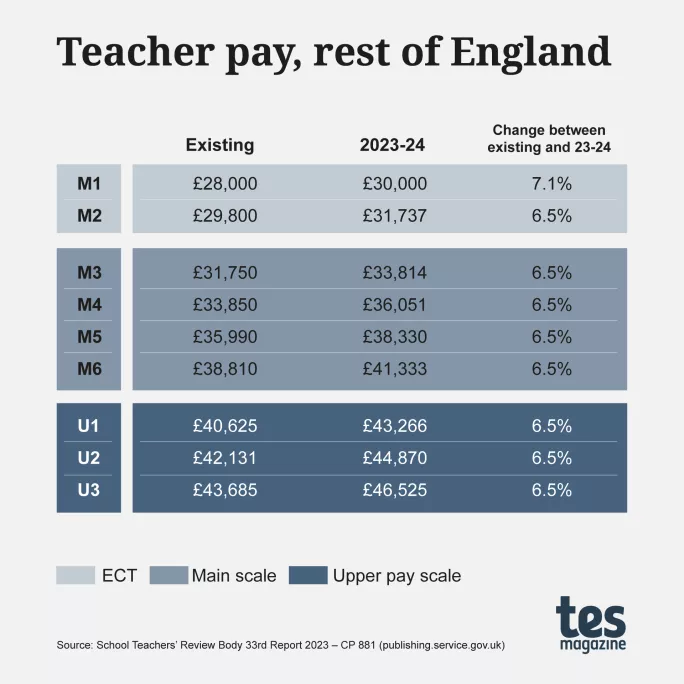
Main and upper pay scale teachers working in the London area will earn:
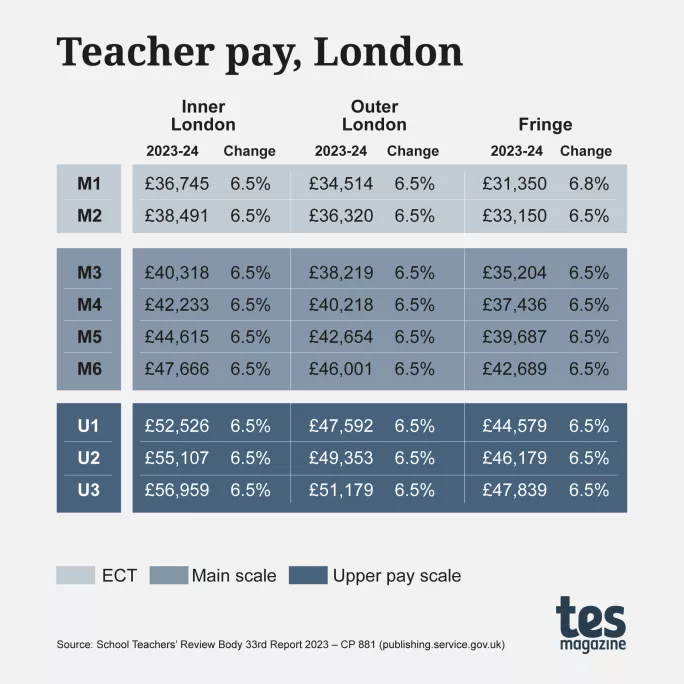
Leadership pay scale
School leaders in England can expect to be paid:
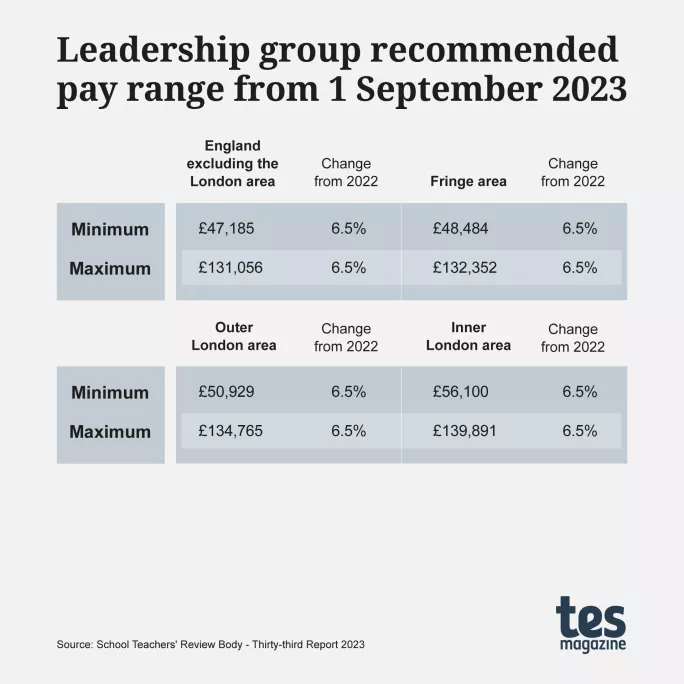
Headteacher pay scale
Headteachers in England can expect to be paid:
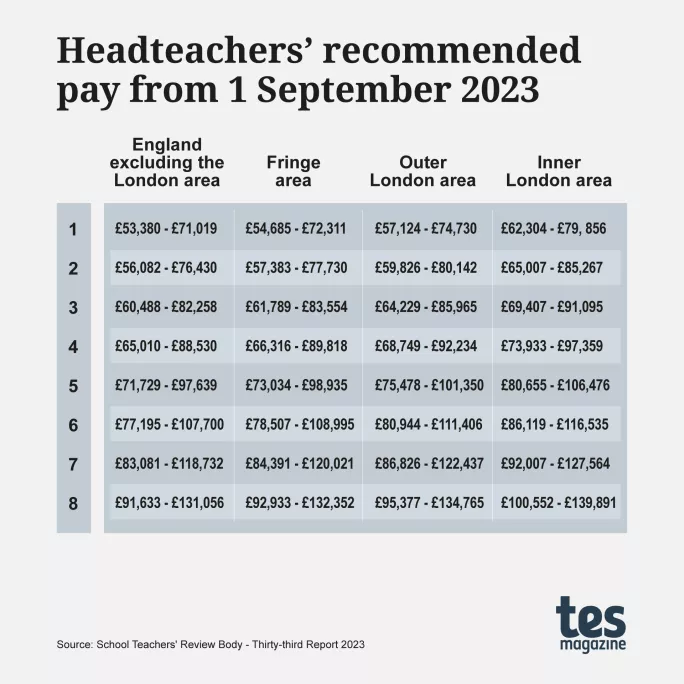
What are the teacher pay scales?
Teacher pay scales are a series of salary bands used to ensure that teaching staff are paid an appropriate wage depending on their responsibilities and their experience.
Which schools use the teacher pay scales?
According to the School Teachers’ Pay and Conditions (STPC) guidance, “schools and local authorities (LAs) must abide by” the pay scales. It adds that “any party not following this guidance would need to have good reason not to do so and would need to be able to justify any departure from it”.
However, non-maintained schools (meaning academies, independent schools, public schools and private schools) are free to set their own pay scales.
It was noted that in the School Teachers’ Review Body 2023 report that although “some multi-academy trusts had moved to systems with a greater focus on staff development” for their appraisal and pay systems, on the whole “the STPC document was still heavily used and valued by academies”.
What do unqualified teachers get paid?
Unqualified teachers (teachers who have not been awarded Qualified Teacher Status) are paid according to a different pay scale.
The unqualified teacher pay scale for 2023-24 ranges from £20,598 to £37,362. How much you are paid depends upon where in England you are working, and how many years of classroom experience you have.
What additional payments do teachers receive?
Teaching and Learning Responsibility (TLR) payments are awarded to teachers who take on additional responsibility. These payments are fixed for the whole of England, and there is no London weighting.
These are also increasing next academic year, and teachers can expect to be paid:
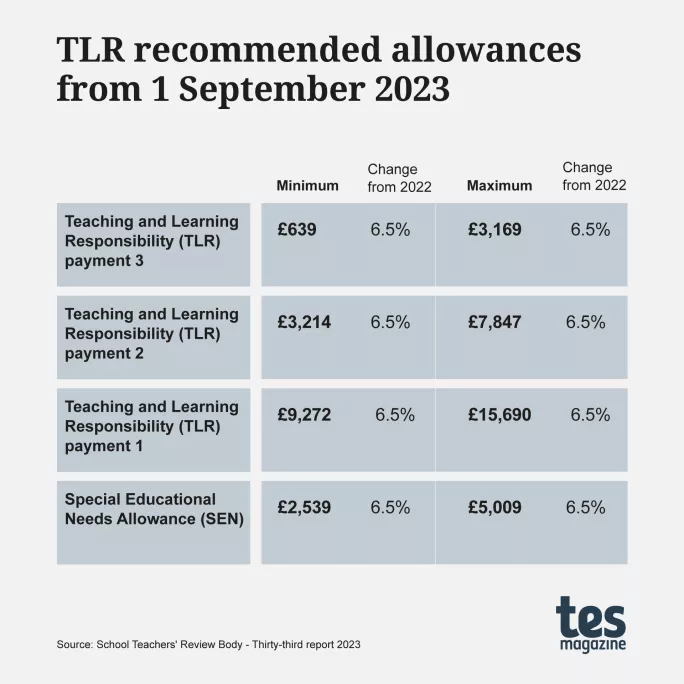
How much will I contribute to my pension?
If you teach in a state school in England, you will be automatically enrolled into the Teachers’ Pension Scheme. The amount you contribute depends on your salary and can range from 7.4 to 11.7 per cent of your total earnings.
Find out more in our complete guide to teacher pensions.
How do teachers get a pay rise?
Generally speaking, teachers move up the main pay scale every year that they are in the classroom, and then reach the upper pay scale, where they are required to produce a portfolio of evidence to demonstrate their contribution to the school.
Once teachers reach U3 on the pay scale, their pay will stop increasing unless they take on extra responsibility with TLR or leadership pay attached.
However, each school will have its own appraisal system. To find out how teachers progress up the pay scale in a school, check your staff handbook or ask your line manager.
What if I decide to change job?
You may decide that the quickest way to move up the pay scale is to find a new job. In which case you’ll need to consult the teacher resignation dates to see exactly when you need to hand in your notice.
Teachers have longer notice periods than a lot of other professions in order to prevent staff leaving part-way through a term, so it’s worth considering your resignation deadline before you look elsewhere.
Do teachers get paid on strike days?
Teachers involved in strike days will not be paid for the day in question. One day’s pay, calculated on the basis of 1/365th of their annual salary, will be deducted from their annual salary.
Find out more about how strike action affects teacher pay in our complete guide to teacher strikes.
topics in this article



